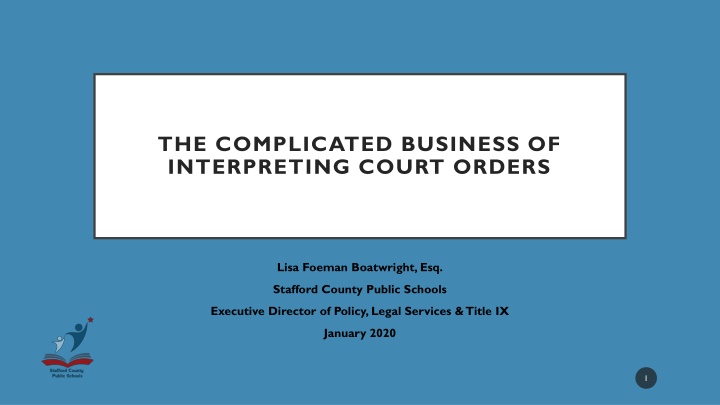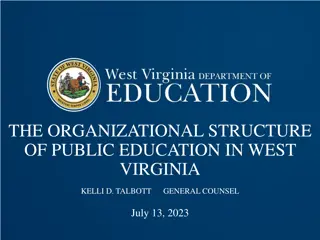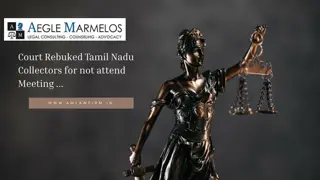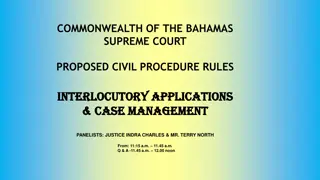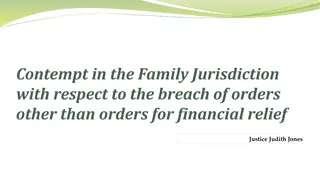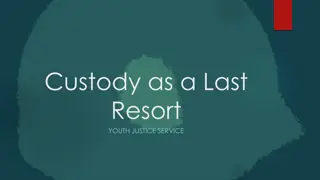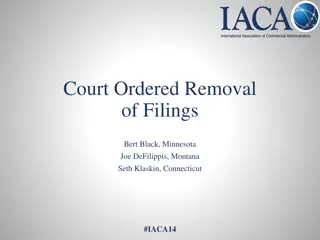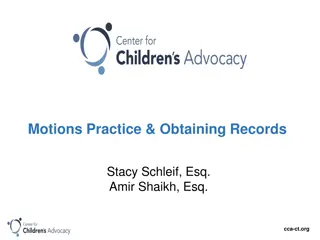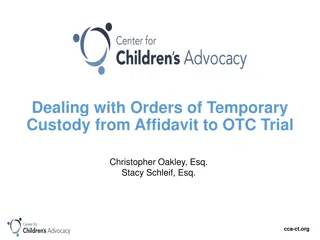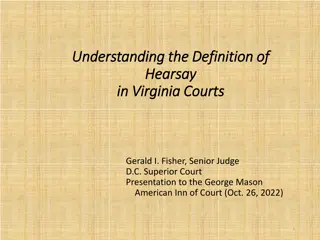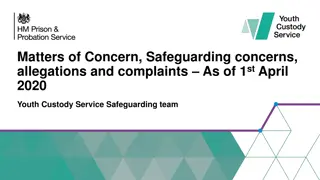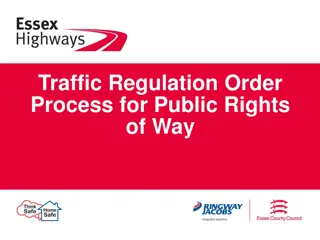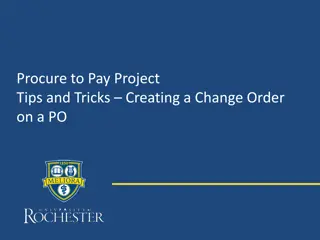Court Orders and Custody Arrangements in Virginia Public Schools
Exploring the complexities of interpreting court orders in educational settings, focusing on custody orders, visitation schedules, and legal responsibilities. The article delves into different types of court orders, Virginia's child custody laws, and the legal framework that guides school staff in handling parental disputes and student records.
Download Presentation

Please find below an Image/Link to download the presentation.
The content on the website is provided AS IS for your information and personal use only. It may not be sold, licensed, or shared on other websites without obtaining consent from the author.If you encounter any issues during the download, it is possible that the publisher has removed the file from their server.
You are allowed to download the files provided on this website for personal or commercial use, subject to the condition that they are used lawfully. All files are the property of their respective owners.
The content on the website is provided AS IS for your information and personal use only. It may not be sold, licensed, or shared on other websites without obtaining consent from the author.
E N D
Presentation Transcript
THE COMPLICATED BUSINESS OF INTERPRETING COURT ORDERS Lisa Foeman Boatwright, Esq. Stafford County Public Schools Executive Director of Policy, Legal Services & Title IX January 2020 1
TODAYS LEARNING GOALS Types of court orders and how to respond Custody order guidance and best practices Who you can legally release students to from school How to handle parental disputes about student records and participation in school activities and conferences FERPA and court orders 3
DIFFERENT TYPES OF COURT ORDERS Custody Order and Visitation Schedules Restraining & Protective Orders Orders Appointing Guardians Ad Litem & Court Appointed Special Advocates Subpoenas 5
CUSTODY ORDERS & VISITATION SCHEDULES 6
TWO TYPES OF CHILD CUSTODY CODE OF VIRGINIA 20-124.1 Joint Custody (i) joint legal custody where both parents retain joint responsibility for the care and control of the child and joint authority to make decisions concerning the child even though the child's primary residence may be with only one parent, (ii) joint physical custody where both parents share physical and custodial care of the child, or (iii) any combination of joint legal and joint physical custody Sole Custody: one person retains responsibility for the care and control of a child and has primary authority to make decisions concerning the child. 7
COURT ORDERS: WHAT DOES THE LAW SAY? The Constitution of Virginia: the school board is responsible for the supervision of public schools. Supreme Court of Virginia case law: judges do not have the authority to require school boards to act in contradiction of their policies and regulations. Code of Virginia 20-124.2, Court-ordered custody and visitation arrangements, provides that [n]othing in this section shall be construed to require any school staff to interpret or to enforce the terms of such custody or visitation order. Parents, not the school division, are the parties to a custody order. Accordingly, only they can enforce the terms and must comply. 8
COURT ORDERS: WHAT DOES THE LAW SAY? (CONT D.) Code of Virginia 22.1-4.3 provides that a noncustodial parent shall not be denied the opportunity to participate in any of the student s school activities in which such participation is supported or encouraged by the policies of the school solely on the basis of such noncustodial status. School activities are defined by the law as including, but not limited to school lunch breaks, special in-school programs, parent-teacher conferences and meetings, and extracurricular activities. Can be listed as an emergency contact for the student's school or day care activities, upon request of the noncustodial parent. 9
COURT ORDERS: WHAT SHOULD YOU LOOK FOR? Awards of sole or joint legal custody to a parent. Designation of one parent as having final authority over educational decisions. Supervised visitation requirement. Protective order, restraining order, or a permanent injunction (prohibitions on parent contact with the child or the school). Restrictions on a parent accessing school records or information about the child. Termination of parental rights. 10
COURT ORDERS PROTECTING STUDENTS: CODE OF VIRGINIA 22.1-279.3:2 As of July 1, 2019, state law requires that principals, upon receiving notice that a court has issued an order for the protection of any child prohibiting contact by a parent or other person shall notify licensed instructional personnel and other school personnel who: provide direct educational or support services to the protected child or the child subject to the order, have a legitimate educational interest in such information, and are responsible for the direct supervision of the protected child or the child subject to the order that such order has been issued. 11
RESTRAINING/PROTECTIVE ORDERS: WHAT ARE THEY? Definition: Legal document issued by a judge to protect the health and safety of a person who is alleged to be a victim of any act involving violence, force or threat that results in bodily injury or places that person in fear of death, sexual assault or bodily injury. Emergency Protective Order, Code of Virginia 19.2-152.8: expires at the end of the third day following issuance or the next day court is in session, whichever is later. Preliminary Protective Order, Code of Virginia 19.2-152.9: lasts 15 days or until a full hearing. Protective Order, Code of Virginia 19.2-152.10: may last up to 2 years. 12
RESTRAINING AND PROTECTIVE ORDERS: WHAT TO LOOK FOR Court order vs. a petition Judge s signature An expiration date Contact limitations 13
RESTRAINING AND PROTECTIVE ORDERS: WHAT TO LOOK FOR (CONT D.) Contact Limitations of Parent: If to children: Consult with your legal counsel or safety department about issuing a no trespass letter especially if the parent causes a disruption. If only to other parent: Then other parent can still come to school and participate in activities with the child even if the other parent objects. Note: The school may need to schedule separate meetings or take measures to prevent the parents from being at school at the same time. 14
RESTRAINING AND PROTECTIVE ORDERS: WHAT THEY DON T DO A parent s rights to participate in educational decisions, to participate in meetings about the child, or to have access to school records are preserved. Parent still retains right to participate in school meetings. May need to schedule separate meetings or use telephone/video conference. 15
PRE-TEST Custody & Visitation Order: Legal Custody: The parties shall share joint legal custody of George. Physical Custody: The Mother shall have primary physical custody of George. Visitation: Father shall have visitation with George every other weekend from Friday at the conclusion of school until Monday before school. The Father shall take George to school and retrieve from school. Question: It s Thursday. Dad comes to school to get George at the end of the day. What do you do? Question: It s Friday. Dad s parents come to school to get George at the end of the day? What do you do? 17
CONSIDERATIONS Rule #1: Follow your division rules and regulations governing release of students. Rule #2: Consider the following: Code of Virginia 20-124.2: no enforcement or interpretation by schools What s the essential question? Release, not visitation. Legal Custody: Have policies in place in the event both custodial parents show up at the same time. Visitation schedule doesn t have to govern. Don t invite trouble! 18
CONSIDERATIONS (CONTD.) Rule #3: Who else can you release to? Stepparents with whom the child resides on a day to day basis in the custodial parent s home . (Should be listed in your SIS as a parent). Recommend to include in division policies. Individuals on the emergency pick-up list authorized by the custodial parent(s). Recommend to include a hierarchy in policies . 19
Parent Participation in School Activities and School Conferences 20
PRE-TEST Custody & Visitation Order: Legal Custody & Physical Custody: The Father shall have sole custody of Kailee. Visitation: The Mother shall have visitation with Kailee every other weekend from Friday at 6 pm until Sunday at 6 pm. Question: The Mother calls the principal saying that she wants to have lunch with Kailee at school on Thursday. Is this permissible? Question: What happens if the Father objects? He does have sole custody after all. Question: What if the Mother s visitation is required to be supervised? Can she still have lunch with Kailee at school? 21
NONCUSTODIAL PARENT PARTICIPATION IN SCHOOL ACTIVITIES A *Noncustodial Parent Has: The same right to access the child s records and information about the child as a custodial parent, The same right to attend school events and conferences as a custodial parent, The right to participate in the special education process, Upon request, the right to be listed as an emergency contact (information only), Has no right to pick up the child (without written consent of the custodial parent or court order) or to make decisions. *Typically a noncustodial parent only has visitation rights. 22
NONCUSTODIAL PARENT PARTICIPATION IN SCHOOL ACTIVITIES (CONT D.) Tips: Advise not to honor a parent s objection to the other parent s participation in a school activity unless the parent provides a court order specifically restricting the other parent from being present on school grounds or from participating in school activities. Can bar participation in school activities for safety or disruption reasons that would warrant a trespass letter. Caution: Supervised visitation. Do you want to get involved? 23
GUARDIANS AD LITEM & COURT APPOINTED SPECIAL ADVOCATES Guardians ad litem & court appointed special advocates with a copy of the order of appointment can inspect and copy records without parent permission. See Code of Virginia 16.1-266.G and 9.1-156, respectively. The Order contains the authority of each. 24
SUBPOENAS 3 Requests: The recipient s appearance at a proceeding; Documents or other tangible evidence in the recipient s possession (subpoena duces tecum); or The recipient s appearance and production of tangible evidence at a court proceeding. 25
SUBPOENAS AND FERPA Written consent from parent or eligible student generally required. See 34 CFR 99.30 Consent Exceptions: See complete list at 34 CFR 99.31 Lawfully issued subpoena or court order. See 34 CFR 99.31(a)(9)(ii) Must make reasonable effort to notify student or eligible parent. Why? Provide opportunity to quash the subpoena to prevent disclosure of educational records. Reasonable effort : case by case basis given totality of the circumstances 26
FERPA NOTICE REQUIREMENTS Recommendations (not in statute or guidance from FCPO): Identify the nature of the order or subpoena and the requested records. State that the institution intends to comply with the subpoena on date X by providing the records requested, to the extent they exist, to the individual identified in the subpoena. Inform the parent or eligible student that if they wish to object to the release of records by the institution, they or their attorney likely would need to file a motion to that effect in the court from which the order or subpoena was issued. Request that the parent or eligible student please send a copy of any such motion to the institution on the day it is filed (to ensure that the institution will not inadvertently disclose the records while the court s decision is pending). 27
ARE THERE ANY NOTICE EXCEPTIONS UNDER FERPA? 28
EXCEPTIONS TO FERPA NOTICE REQUIREMENTS 34 CFR 99.31(9)(ii)(A): To comply with a federal grand jury subpoena or a law enforcement subpoena and the court has ordered that the existence or the contents of the subpoena or the information furnished in response to the subpoena not be disclosed In specified types of judicial proceedings, an institution does not have to provide advance notification to a parent if the court already has given the parent notice because the parent is a party to the court proceedings 29
PARENTAL DISPUTES ABOUT ACCESS TO STUDENT RECORDS FERPA, 34 CFR 99.4, states: An educational agency or institution shall give full rights under the Act to either parent, unless the agency or institution has been provided with evidence that there is a court order, state statute, or legally binding document relating to such matters as divorce, separation, or custody, that specifically revokes these rights. Family Policy Compliance Office (FPCO) guidance states: In the case of divorce or separation, a school district must provide access to both natural parents, custodial and non-custodial, unless there is a legally binding document that specifically removes that parent's FERPA rights. A legally binding document: a court order or other legal document that prohibits access to education record, or removes the parent's rights to have knowledge about his or her child's education. Stepparents and other family members: (Stepparents living in the home with the student have FERPA rights). 30
STATE LAW LIMITING STUDENT RECORDS ACCESS Beware of Code of Virginia 22.1-287.1 [N]o school shall disclose the address, telephone number, or email address of a student pursuant to 34 C.F.R. 99.31(a)(11) or [FOIA] unless the parent or eligible student has affirmatively consented in writing to such disclosure. 34 C.F.R. 99.31(a)(11) refers to directory information which generally can be disclosed without advance notice or consent. This Virginia statute narrows the directory information exception. 31
